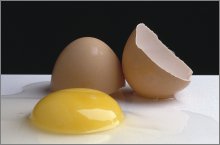Choline Found in Eggs May Help Lower
Heart Disease, Cancer & Dementia Risk
by www.SixWise.com
Choline is a B vitamin that has only within the past decade
begun to receive attention. The body does make (small amounts)
of choline on its own, but diet is a major source of the nutrient.
However, as Americans' diets are often inadequate (and based
on too many junk foods), scientists realized that some people
are at risk of choline deficiency, and a recommended daily
intake was established in 1998.
|

One large egg contains 126 mg of choline ... an
excellent source to help you reach the daily recommended
intake of this essential B vitamin.
|
Today even more is known about the importance of choline,
not only to maintain your health but also to prevent disease.
Choline Helps Prevent an Array of Diseases
Getting enough choline is an important way to ensure your
health. Research has uncovered that choline is beneficial
in the following ways:
-
Reduce homocysteine in the blood. Elevated homocysteine
(even moderately elevated) levels in the blood have been
linked to an increased risk of heart disease and osteoporosis.
Studies have found that choline helps prevent the build-up
and reduce levels of this harmful substance in the blood.
-
May Prevent Cancer. Studies in rats have found
that choline deficiency is linked to an increased risk
of liver cancer and an increased sensitivity to cancer-causing
chemicals.
-
Protect Your Liver. Choline deficiency is linked
to increased oxidative
stress in the liver and liver damage.
-
May Prevent DNA Damage. Choline deficiency is
known to decrease methylation of DNA, which may result
in abnormal DNA repair.
-
Protect Your Baby's Brain During Pregnancy. Animal
studies have shown that too little choline permanently
damages fetal brain chemistry. Further, studies suggest
that choline intake during pregnancy might decrease the
risk of spina bifida.
-
May Protect Against Dementia. Choline promotes
the production of acetylcholine, a neurotransmitter that's
a key building block of memory. A deficit of acetylcholine
has been linked to Alzheimer's disease and dementia.
-
Beneficial for Cell Membranes. Choline helps keep
your cell membranes, which allow nutrients to enter (and
wastes to leave) your cells, working properly.
-
Promote Nerve System Communication. Choline allows
your nerves to communicate effectively with your muscles.
How Much Choline is Recommended, and What Foods Contain
It?
|

Getting enough choline during pregnancy is essential
to protect your baby's brain and decreases the risk
of the birth defect, spina bifida.
|
According to the National Academy of Sciences, the Adequate
Intake (AI) levels for choline are:
-
550 milligrams (mg) per day for adult men
-
425 mg/day for adult women
-
450 mg/day for pregnant women
-
550 mg/day for nursing women
If you'd like to increase choline in your diet, it's found
in beef liver, egg yolks, fish, butter, peanuts, wheat germ,
potatoes,
cauliflower, lentils, oats, sesame seeds, flax seeds, sunflower
seeds, and soybeans. Following is a list of the choline content
of a variety of foods:
-
Beef liver (3 ounces): 355 mg
-
Wheat germ (1 cup): 172 mg
-
Egg (1 large): 126 mg
-
Atlantic cod (3 ounces): 71 mg
-
Beef (3 ounces): 66 mg
-
Broccoli (1 cup, cooked): 62 mg
-
Peanut butter (2 Tbs): 20 mg
Aside from eating choline-rich foods, choline is also available
in supplement form. The most common choline supplement is
in the form of lecithin, which is extracted from soy. Soy-free
choline supplements, and choline itself, are also available.
(Remember to talk to your health care provider before starting
any vitamin
supplementation.)
Recommended Reading
Magnesium:
Why Your Heart is Begging You for More of This Essential Nutrient
Nutritional
Deficiency: Symptoms & Recommendations for 24 Common Nutritional
Deficiencies
Sources
Science
Daily December 22, 2006
Linus
Pauling Institute
The
World's Healthiest Foods
Science
News Online